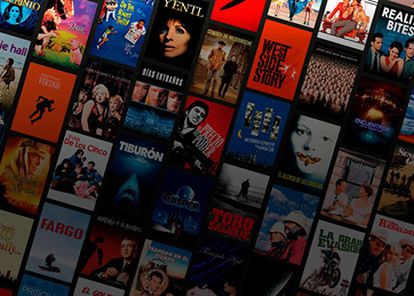Play next chapter. And next. And next. And next. Do not go. Have you finished the season? Don't worry, we recommend these series based on what you've seen. Or these movies, in case you want to change the format. Or why not take a marathon. All weekend without leaving the sofa to catch up. To remember where you had stayed. Audiovisual platforms earn money with our time, with our attention. Not even Netflix autoplay gives a respite. In five seconds jump to the next content, when months ago it allowed you about 10 in case you decided to stop. This is about unbridled consumption. And also a certain normalized addiction.
Countless conversations revolve around series and movies. Much of social life is built on this content. No one is surprised that a friend comments that yesterday he went to bed at four in the morning because he could not stop watching, for example,
Game of Thrones
. All thought so that you stay stuck there. You can skip the credits, introductions and even watch movies and series at twice the speed - consumers known as
faster
. As Gabriela Paoli, an expert psychologist in technological addictions, explains, more and more patients with this type of behavior come to his office. “Some tell me that they are with three monitors at the same time. In one they play, in another they see a series and in the third they sail ”, he assures.
Tom Hiddleston and Sophia Di Martino in a still from the series 'Loki' Chuck Zlotnick / Chuck Zlotnick
According to the latest data published by Barlovento Comunicación, Spaniards spend an average of four and a half hours a day in front of the television.
Both in traditional channels and in audiovisual platforms.
This is the highest figure in all of Europe.
A constant trend for decades.
Jaume Ripoll, co-founder of Filmin, acknowledges that television consumption in Spain is very high, but that at no time did anyone consider talking about television addiction.
“I worked in a video store and there were people who took seven movies for the weekend;
and nothing happened.
The digital entertainment model has not changed anything.
Do we complain that someone reads a lot by spending hours and hours with a book? ”He asks.
The audiovisual industry has studied the needs of users, thanks in large part to algorithms designed to interpret tastes, navigation and behaviors. From here, the rest is rolled. Ease of access, in little more than one click, and an offer that disconnects us from everyday problems. In the words of Marian García, director of Orbium Desarrollo, the voracious consumption of series serves as vital anesthesia. A method of escape from emotional suffering or frustration generated by everyday life. “We stop seeing the world around us. You have to reflect on how long I do healthy leisure and how much I invest in this. I advise my patients a maximum of two hours of series and movies every day ”, he says.
The recommendation of 120 minutes is by no means accidental.
It is the time from which the brain begins to get distracted.
The turning point before we start to get distracted, tired and stressed.
"This is the threshold from which our attention decreases to 100%," says Paoli.
A cap that hardly matters for platforms.
While it is true that minors can establish a consumption limit, either on YouTube or Filmin, the same tools disappear with the age of majority.
“I am not one to tell a subscriber how to view content.
How would I like you to do it?
Always with attention.
To have it there in the background, better leave it ”, Ripoll ditch.
Endorphins and dopamine
Behind the voracity, the seriéfilo hitch, there is a physiological explanation. The segregation of endorphins and dopamine that rewards our body with the satisfaction of not stopping consuming chapters and chapters. “The brain is very lazy. If you give him something that feeds his well-being, he will reward you right away. Then you realize that you have been doing just that activity for a long time, ”Garcia reasons. “I think the main danger is being unaware that we behave in this way. And it's like groundhog day. Over and over again we repeat the same attitude ”, he clarifies.
The pandemic has exacerbated the confinement at home. This is where digital entertainment comes into its own. The unstoppable rise of users has stopped in recent months, but any platform has its subscribers in the millions. According to the co-founder of Filmin, companies are faced with the dilemma about how to manage the abundance of entertainment. It does not provide a strong answer unless the learning process has just begun. “I don't know how we are going to solve this challenge. It happens in almost the same terms with music. I just hope that the platforms will abandon any paternalism with respect to consumers ”, he agrees.
Most experts agree that talking about responsible consumption is almost inappropriate in this sector. With video games or
online
gambling,
no one hesitates to put addiction on the table. With series and movies, the discourse differs. Technology has brought and accelerated world entertainment. A phenomenon that continues to grow. Platforms jump from one continent to another. There are the examples from Disney + and Hulu. A different story is the normalization of an entertainment that aims to hook us. “It is designed so that you do not realize it and fall. We are little aware of the content we consume. The market catches you. It pushes you there ”, concludes Paoli.
You can follow EL PAÍS TECNOLOGÍA on
and
or sign up here to receive our
weekly newsletter
.














